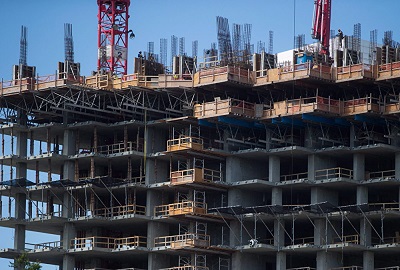 Friday, July 26, 2024
Friday, July 26, 2024  Friday, July 26, 2024
Friday, July 26, 2024 
Got news? Next submission deadline is Friday at 5:00 p.m.
Click here to submit YOUR news

Canadian steel buyers are racing to get construction steel into the country to claim first-come, first-serve exemptions from tariffs that were meant to stabilize the country’s market in the wake of U.S. President Donald Trump’s metals tariffs.
With steel prices already high, the companies that fabricate steel structures used in major building projects say the import controls, which cover at least 600,000 tonnes of steel, are making it even more difficult to operate because they cannot predict the price of basic materials.
The disruption is the latest consequence of Canada’s response to U.S. protectionism, which has been to layer on more tariffs to protect local mills owned by Stelco Holdings Inc and ArcelorMittal, raising metal prices in both countries. They are the public companies with primary steel mills as well as Essar, which owns a third primary mill.
“It’s causing havoc,” said Cory Pittman, operations manager at Allstar Rebar in Newfoundland, on Canada’s East Coast. “Trying to run a business is like playing roulette.” Rebar is steel used to reinforce concrete and masonry.
In late October Canada imposed a system of quotas and tariffs on seven categories of steel to prevent cheap metal from flooding into the country as Trump’s tariffs forced overseas producers to seek new markets. But the first firm to get steel to a Canadian dock gets to use the tariff-free quota.
Shipments above previous average import levels from many countries now face a provisional 25 percent tariff. The quota system makes it impossible for buyers to know more than five days before delivery whether their goods will be subject to the tariff because there is no way to apply for quota in advance.
Canada, which produced about 14 million tonnes of steel in 2017, typically imports more of the metal than it exports, some 2.1 million tonnes more last year, according to the U.S. Department of Commerce.
The construction industry says only about one-half of its steel can be made in Canada. Because of its distance from Canadian mills, Newfoundland is particularly dependent on imports. Allstar is bidding on work for next year with no way of knowing whether it will have to pay a tariff on its raw materials.
Elsewhere, the chief executive officer of one West Coast fabricator recently traveled to Singapore to arrange a rush shipment of rebar back to Canada – something that was never necessary before.
Watch the video and learn more about the benefits of joining Construction Links Network – the peer-to-peer network sharing platform for the construction, building and design community.
Ideal for YOUR Press Releases | Project Updates | New Appointments | Awards & Milestones | Company News | New Products/Services | Brochures | Videos | Infographics | Blog Sharing | Events and More